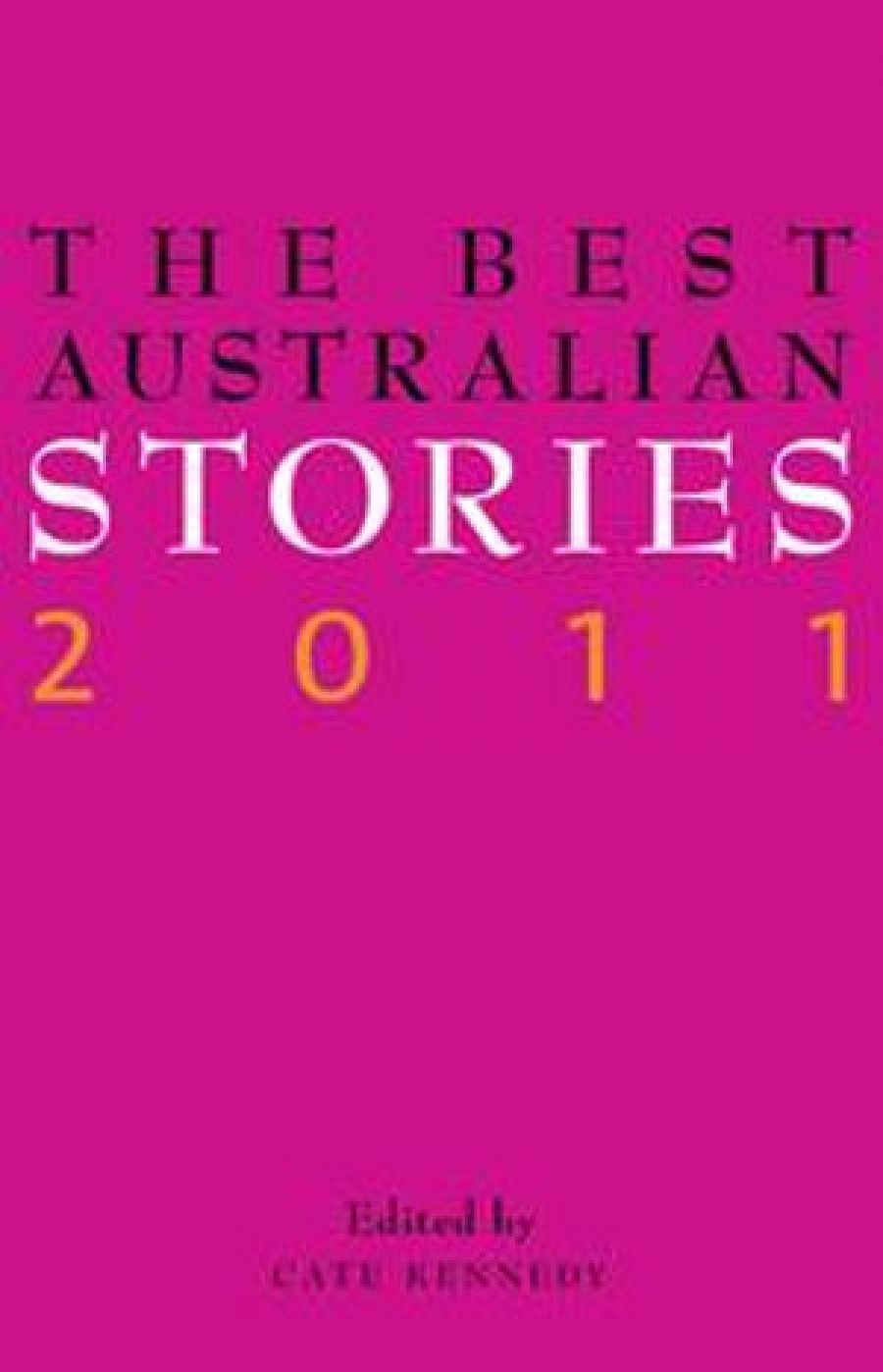
- Free Article: No
- Contents Category: Anthology
- Review Article: Yes
- Online Only: No
- Custom Highlight Text:
The ABC Shop is currently selling online The Best Australian Stories 2010 for $14.99. ‘Ideal for summer reading’ its advertising says, and it surely doesn’t matter which summer. At that price you might get yourself a copy and sling it in your beach bag, unless you suspect it might dampen your holiday mood. More than a few reviewers found the overall tone of the collection bleak and negative: ‘one of the more depressing reads of the year’, wrote Chris Flynn in these pages (February 2011). If that doesn’t sound like ideal beach reading, shell out the full RRP and buy The Best Australian Stories 2011.
- Book 1 Title: The Best Australian Stories 2011
- Book 1 Biblio: Black Inc., $29.95 pb, 256 pp, 9781863955485
The editor is once again Cate Kennedy, herself a prolific and award-winning writer in the genre. She observes – as editors of such anthologies invariably do – that if the ‘vitality and diversity of subject matter is anything to go by, the state of short fiction in Australia is alive and thriving’. It is certainly thriving in universities, where the short story is the lifeblood of Creative Writing classes. Nineteen of this year’s thirty-one contributors have Creative Writing degrees, and most are teaching the subject. It would be gratifying to think that students across the country are reading and buying the literary journals that first published most of these stories.
But diversity of subject matter? Only if you think content and theme are totally separate. The Best Australian Stories 2011 could almost be subtitled ‘The Parenthood Issue’. More than a third of the stories concern themselves with mothers – pregnancy, babies, responsibilities, guilt – while several more revolve around fathers and parenting.
Among those who explore maternal themes are Rebecca Giggs (a mother’s guilt about her daughter’s involvement in a bushfire that destroys a town); Gretchen Shirm (a mother’s guilt about covering up her son’s car accident); Mark Dapin (a mother’s desire to be reunited with her baby is not enough to overcome temptation when she’s released from prison); Karen Manton (a mother’s unease during a family outing to the beach before a planned caesarian); Liam Davison (an Indian doctor and mother ponders gender selection in a maternity ward); Leah Swann (a mother cuts the apron strings after her son’s dog dies); Deborah FitzGerald (a mother finally decides what to do with her daughter’s ashes a decade after her death); Mark O’Flynn (a Plymouth Brethren mother gives birth to a strangely shrivelled baby, while a maternity nurse ponders the significance of a plague of bats); Debra Adelaide (a writer tends to her dying mother in a neurology ward while planning her next book and reading the Brontës); Stephanie Buckle (a daughter evaluates her mother’s fifty years of married life as, and after, she dies of a stroke); and Favel Parrett (a little boy yearns for a mother who fails to arrive at the airport).
Paternal and parental themes are explored by Michael Sala (a new father broods over childhood traumas occasioned by various men in his life); Nick Smith (a father takes his children to an indoor playground and fails to amuse them); Sharon Kent (a Top End tour guide identifies with an old saltie and feels unexpectedly sentimental about his absent baby); Catherine Cole (an Iraqi refugee awaits the arrival in Australia by boat of his daughter and grandson); Chris Womersley (a young boy discovers a strange woman hiding in his backyard who seems to know a lot about his dad); Nicholas Jose (a mother discovers her son’s suicide and a bereaved father takes his young son to a Mahler concert); and Tim Richards (foundling babies appear overnight on doorsteps around town). This story, ‘(Favoured by) Babies’, contains the single funniest sentence in the collection: ‘Karen and Marie had each entertained sperm provided by a mutual friend’. With tea and biscuits, perhaps?
Dead or dying mothers are an overused plot device in children’s literature, where they are useful in granting a degree of independence to young protagonists. Here, in five of the stories, it is either old age catching up with the mothers of baby boomers, or husbands trying to come to terms with the death of a wife. Note to writers: fathers and husbands die too.
That doesn’t leave many stories about the child-free, but among them I liked Louis Nowra’s ‘The Index Cards’, which tells an ominous tale within an original and economical framework, and Karen Hitchcock’s ‘Forging Friendship’, a Facebook story with a rare touch of humour. Hitchcock nails the first-person narration. Another author whose strength lies in the authenticity of voice is Miriam Sved; it is impossible not to empathise with Ranga, an oldie on the football team who is rapidly being overtaken by the youngest rookie, ‘a number-two draft pick’ with a ‘slight glow of entitlement around the older blokes’. A few of the stories amble along but ultimately go nowhere, while ‘Look Down with Me’, by Jennifer Mills, goes somewhere so unpleasant it should perhaps be preceded by a warning. Two grey nomads are literally on ‘The Road to Nowhere’ in Russell King’s amusing but feather-light story of catastrophe in their new ‘Willebago Esperance’. (I’m almost sure that should be a Winnebago.) Not all the stories live up to that ‘best’ in the title, and joy is in short supply, but overall this is a stronger collection than last year’s.


Comments powered by CComment